The 12 Best Shopify Referral Apps 2026 (Expert Tested)
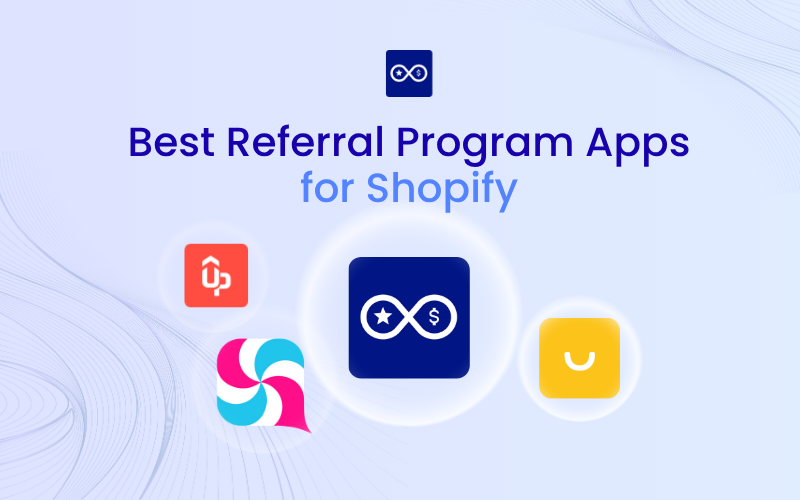
Word-of-mouth recommendations drive more sales than any ad campaign, yet most Shopify merchants leave this channel completely untapped. Referral apps automate the process of turning happy customers into brand advocates by creating trackable links, managing rewards, and measuring results—all without requiring technical expertise or expensive agency support.
This guide breaks down the 12 best Shopify referral apps based on hands-on testing across live stores, comparing features, pricing, and real-world performance. You’ll learn how each app works, which types of merchants they serve best, and how to choose the right platform for your store’s growth stage.
Why Use a Shopify Referral App
Referral apps automate the process of turning customers into brand advocates by creating trackable links, managing rewards, and measuring results. When someone uses a referral app like ReferralCandy or Bloop, their customers get unique links to share with friends, and both parties receive rewards when those friends make purchases. The app handles everything from generating links to tracking conversions to distributing discount codes automatically.
The power of referral marketing comes from trust. When a friend recommends a product, that recommendation carries more weight than any ad you could run. Here’s what makes referral apps valuable:
- Lower acquisition costs: Referrals typically cost 50-70% less than paid ads because you’re rewarding existing customers instead of paying ad platforms
- Higher conversion rates: Referred customers convert 3-5 times more often than cold traffic because they arrive with a trusted recommendation
- Increased lifetime value: Referred customers tend to stick around longer and spend about 16% more over time
Beyond the numbers, referral programs give your happy customers a way to share products they genuinely love. This creates a cycle where satisfied customers bring in more customers who become advocates themselves.
How We Tested and Ranked the Apps
We installed each app on live Shopify stores across different industries, from fashion to supplements. Our testing included setting up complete referral programs, going through the customer experience as both the person sharing and the person receiving a referral link, and seeing how each app handled tricky situations like fraud attempts.
Criteria Used for Evaluation
Six factors determined our rankings:
- Ease of setup: How quickly you can install the app and launch your first campaign without calling a developer
- Customization options: Whether you can offer percentage discounts, fixed amounts, free products, or other reward types
- Integration capabilities: How well the app connects with Shopify checkout, email tools, and customer accounts
- Fraud prevention: Built-in tools to catch self-referrals, fake accounts, and other abuse patterns
- Customer support: How fast the team responds when something breaks or you have questions
- Pricing value: What you get for what you pay, including whether free plans actually work
Data Sources and Test Store Setup
We combined hands-on testing with analysis of verified merchant reviews from the Shopify App Store. We focused on stores that had used each app for at least six months, which gave us a realistic picture of long-term performance across different store sizes and industries.
Comparison Table of Features and Pricing of best shopify referral plugins
| App | Starting Price | Free Plan | Best For | Key Strength |
| Bloop | $19.9/mo | Yes | Growing brands | Dual referral/affiliate with fraud prevention, simple to setup |
| ReferralCandy | $59/mo + 3.5% | No | Enterprise stores | Advanced features and customization |
| UpPromote | Free | Yes | Affiliate-focused | Multi-tier affiliate structures |
| Smile.io | $49/mo | Yes (limited) | Loyalty + referrals | Integrated retention strategy |
| Loox | $12.99/mo | No | Visual brands | Review-driven referrals |
| Referral Factory | $95/mo | No | Quick launch | Pre-built templates |
| Rivo | $49/mo | Yes (under 200 orders) | Design-conscious brands | Visual customization |
| LoyaltyLion | $399/mo | No | Enterprise | Data-driven optimization |
| BON Loyalty | $29/mo | Yes | International stores | Multilingual support |
| Conjured Referrals | $49/mo | No | Referral-only focus | Streamlined simplicity |
| LeadDyno | $49/mo | No | Affiliate networks | Multi-tier commissions |
| Affiliatly | $16/mo | No | Budget-conscious | Affordable entry point |
The 12 Best Shopify Referral Apps
Each app serves different types of merchants based on store size, technical comfort, and program complexity. Some excel at simplicity while others offer enterprise features for brands managing large networks.
1. Bloop Referrals & Affiliates
Bloop combines referral and affiliate marketing in one dashboard built specifically for Shopify. The app handles both customer referrals and partner affiliate programs, which makes it useful for brands planning to grow beyond basic referral marketing.
The standout feature is fraud prevention that automatically catches suspicious patterns without blocking legitimate customers. Setup takes about 10 minutes, and the interface walks you through creating rewards, customizing emails, and setting up sharing options. You don’t need technical knowledge to get started.
Bloop offers unlimited referrals and affiliates on all paid plans, starting at just $19.90/month after a 14-day free trial. Trusted by over 2,000 Shopify merchants and backed by 190+ five-star reviews, Bloop helps you grow effortlessly through word-of-mouth.
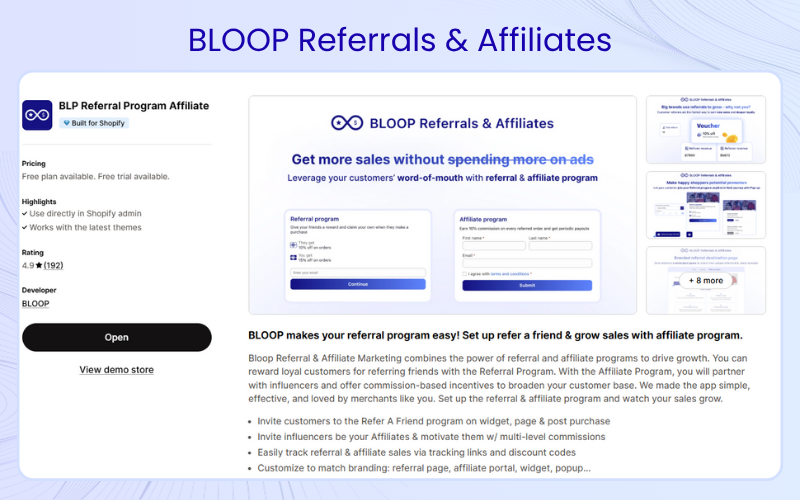
2. ReferralCandy
ReferralCandy represents the enterprise option in this space. The platform has powered referral programs for major brands since 2012, building a reputation for reliability and sophisticated features like multi-currency support and custom API access.
The app excels at complex reward structures, including tiered rewards that increase as advocates refer more customers. However, this flexibility comes with a steeper learning curve and higher price point starting at $59/month plus 3.5% commission on referred sales, or $299/month with no commission.
ReferralCandy works best for established stores processing significant monthly revenue who want enterprise features and are willing to invest time in optimization.
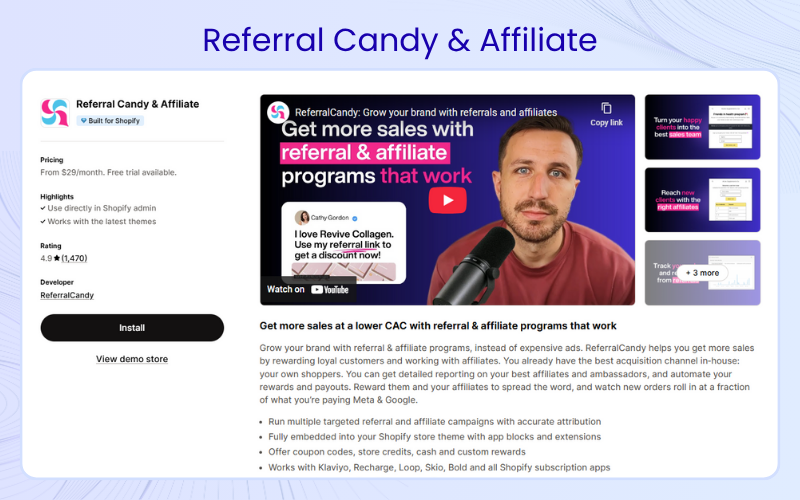
3. UpPromote
UpPromote focuses primarily on affiliate marketing but includes referral capabilities. The app supports multi-tier structures where affiliates can recruit sub-affiliates and earn commissions from their sales.
Tracking happens through unique coupon codes, referral links, and QR codes, plus detailed analytics showing which affiliates drive revenue. The free plan supports unlimited affiliates with basic features, while paid plans starting at $29.99/month add advanced customization.
This app fits merchants who plan to build substantial affiliate networks alongside customer referrals and want comprehensive tracking across both channels.
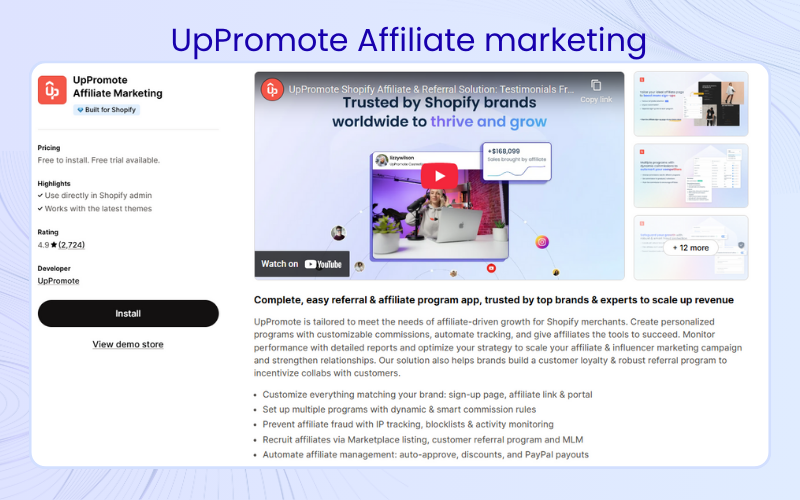
4. Smile.io
Smile.io integrates referrals within a broader loyalty platform that includes points, VIP tiers, and rewards for various customer actions. This combination works well for brands wanting a comprehensive retention strategy rather than focusing solely on referrals.
The referral component lets customers earn points when friends make their first purchase, and those points can be redeemed for discounts or free products. However, the loyalty focus means referral-specific features are less robust than dedicated referral apps.
Smile.io offers a free plan with basic functionality, while paid plans start at $49/month. The app suits merchants who want to test loyalty programs alongside referrals.
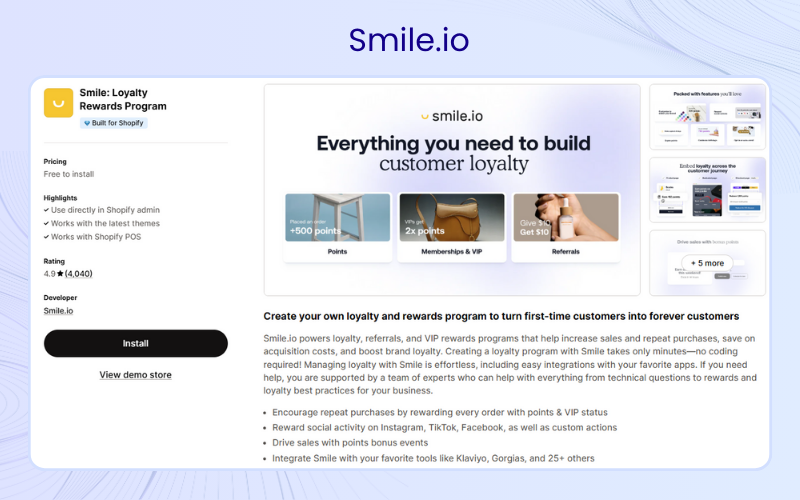
5. Loox
Loox approaches referrals through photo reviews. Customers share product images in exchange for discount codes they can give to friends. This strategy combines social proof with word-of-mouth marketing, creating visual content while driving new customer acquisition.
The app automatically requests reviews after purchase and offers discount codes as incentives for both leaving reviews and referring friends. This generates user-generated content that can be displayed on product pages while building referral traffic.
Pricing starts at $12.99/month for up to 100 review requests monthly, scaling to $299.99/month for unlimited requests. Loox works best for visually-oriented brands in fashion, beauty, or home decor.
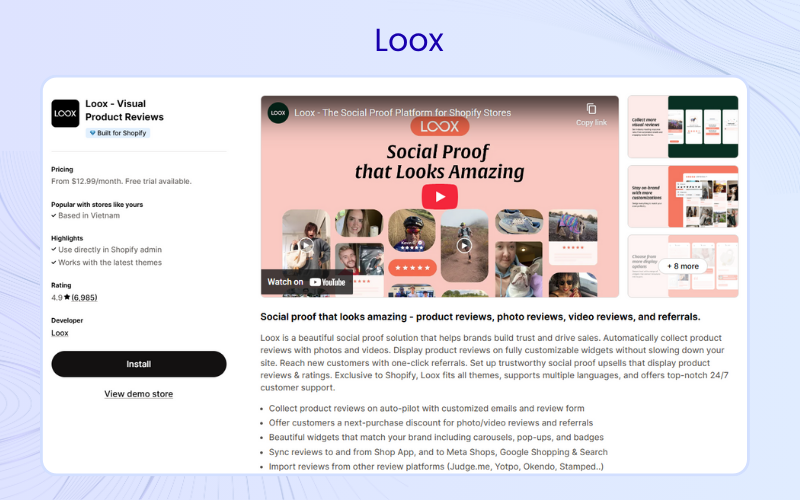
6. Referral Factory
Referral Factory provides pre-built referral program templates across various industries. You can launch campaigns quickly by customizing proven frameworks instead of building from scratch.
The app offers one-click sharing to social media, email, and messaging apps, plus automatic reward fulfillment when referrals convert. Customization options are more limited compared to other platforms, which can be either a benefit (faster setup) or limitation (less flexibility).
Pricing starts at $95/month, positioning Referral Factory in the mid-market segment.
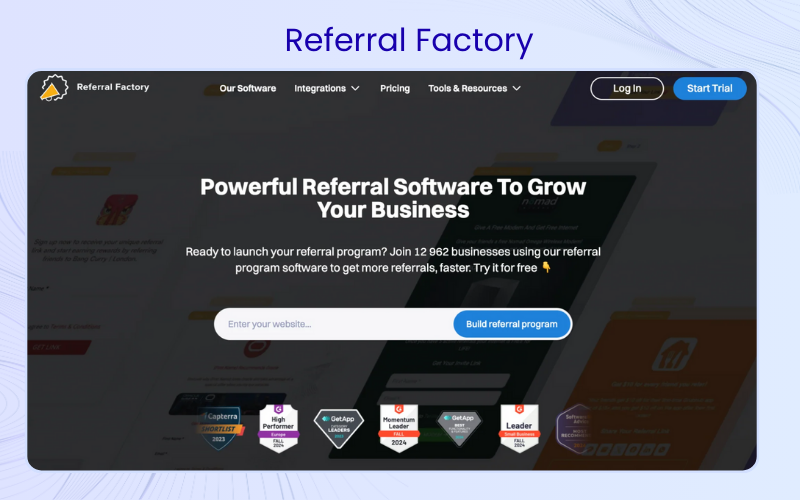
7. Rivo
Rivo combines loyalty points, referral rewards, and VIP tiers with extensive customization for branding and design. The platform emphasizes visual customization, letting you match the referral widget and customer portal to your store’s look.
The referral program supports both advocate and friend rewards with flexible discount types, while the loyalty component adds points for purchases, social follows, and birthdays. This integrated approach helps create a cohesive retention strategy.
Rivo offers a free plan for stores under 200 monthly orders, with paid plans starting at $49/month.
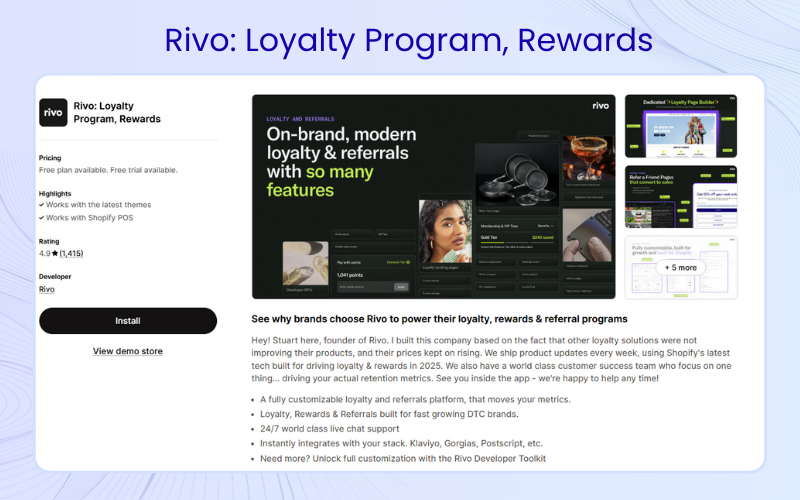
8. LoyaltyLion
LoyaltyLion targets mid-market and enterprise brands with sophisticated loyalty programs that include referral capabilities alongside points, tiers, and experiential rewards. The platform emphasizes data-driven optimization with detailed analytics showing program ROI and customer segmentation.
Referral features integrate with the broader loyalty ecosystem, allowing customers to earn points for successful referrals that can be redeemed across various reward options. However, referrals represent just one component rather than the primary focus.
Pricing starts at $399/month, making LoyaltyLion suitable for established brands with significant customer bases.
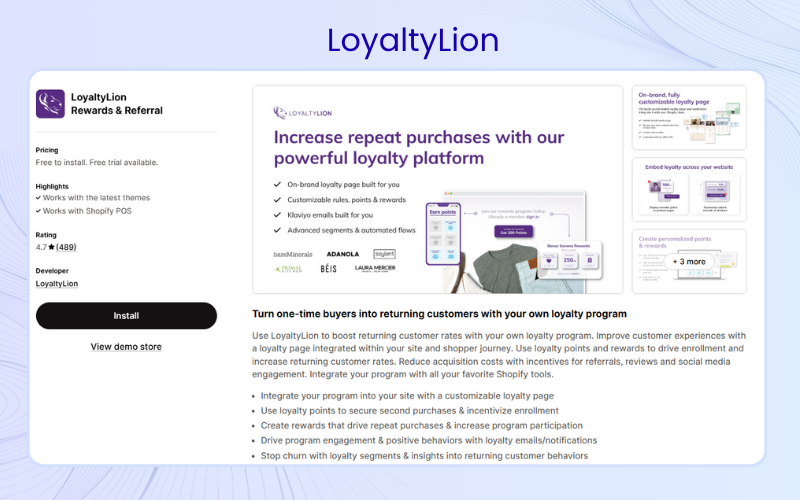
9. BON Loyalty
BON Loyalty offers loyalty points, referral rewards, and review incentives with support for over 250 languages and currencies. This multilingual capability makes BON particularly valuable for merchants selling internationally.
The app includes both online and POS integration, allowing customers to earn and redeem rewards across all channels. The referral program supports customizable rewards for both advocates and friends with automatic tracking and fulfillment.
BON offers a free plan with basic features, while paid plans start at $29/month.
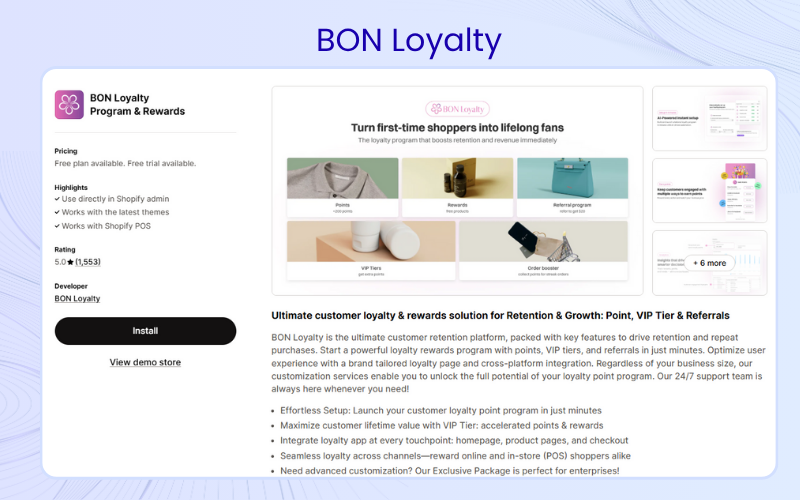
10. Conjured Referrals
Conjured Referrals focuses exclusively on referral marketing without loyalty or review features. The app offers post-purchase pop-ups, email campaigns, and a customer portal where advocates can track their referrals and rewards.
The platform includes basic fraud prevention and supports various reward types including percentage discounts, fixed amounts, and free shipping. However, the feature set is more limited compared to newer competitors, and the interface shows its age.
Pricing starts at $49/month for merchants wanting straightforward referral programs without additional features.
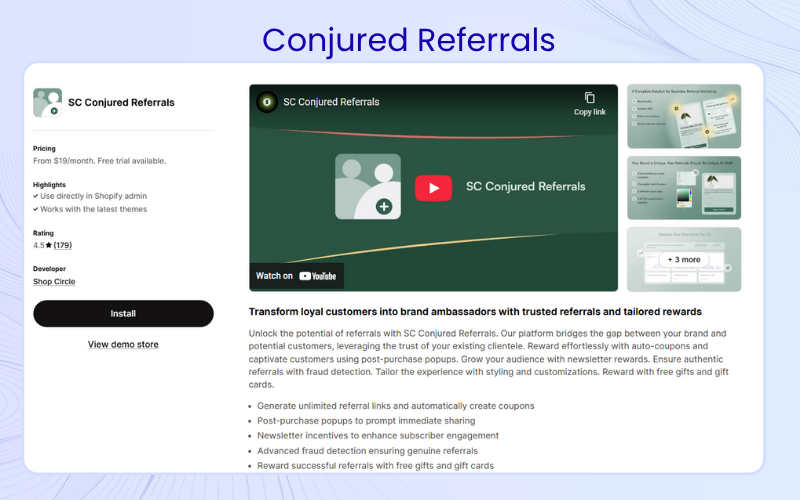
11. LeadDyno
LeadDyno emphasizes affiliate marketing with additional customer referral capabilities. Features include multi-tier commissions, affiliate recruitment tools, and integration with email marketing platforms. The app provides affiliates with promotional materials, tracking dashboards, and automated commission payments.
The customer referral component works alongside the affiliate program, letting you manage both channels from one dashboard. However, the platform’s affiliate focus means customer referral features are less developed than dedicated referral apps.
LeadDyno starts at $49/month for up to 50 affiliates, scaling to $499/month for unlimited affiliates.
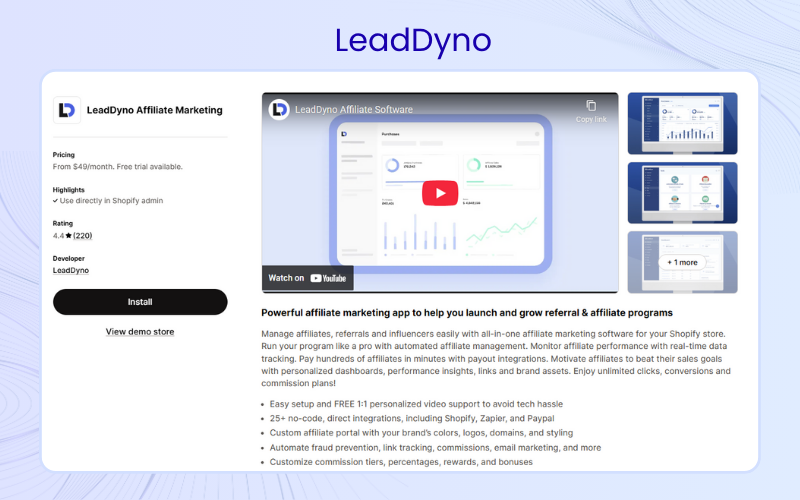
12. Affiliatly
Affiliatly provides straightforward affiliate and referral program management with essential features like custom commission structures, coupon code tracking, and affiliate dashboards. The platform emphasizes simplicity over advanced features.
The app supports unlimited affiliates on all plans and includes basic reporting showing which affiliates drive revenue. However, fraud prevention and advanced automation features are limited compared to more robust platforms.
Pricing starts at $16/month, making Affiliatly one of the most affordable options for basic affiliate and referral functionality.
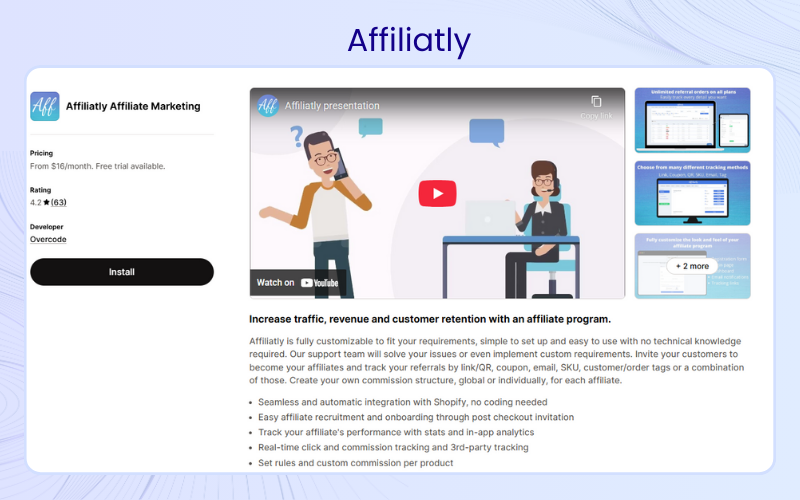
How to Choose the Best Referral App for Your Store
Picking the right app depends on matching your current business stage with features that will actually deliver value. A new store with 50 orders per month has different requirements than an established brand processing thousands of transactions.
Match Features to Growth Goals
Start by identifying your primary objective. Are you focused on turning existing customers into advocates, building an affiliate network, or creating a comprehensive loyalty ecosystem? If you’re just starting with referral marketing, look for an app that offers quick setup and proven templates rather than complex customization you won’t use yet.
Brands planning to scale beyond basic customer referrals benefit from apps that support both referral and affiliate programs from the start. This prevents the headache of migrating programs later when you’re ready to recruit external partners.
Evaluate Pricing Versus ROI
Calculate your potential return by estimating how many referrals you might generate monthly and what each new customer is worth. If your average order value is $100 and referred customers typically spend 20% more, each referral is worth approximately $120 in immediate revenue plus future purchases.
Compare this potential revenue against app costs. Percentage-based pricing models become expensive as your program succeeds, while fixed monthly pricing often delivers better value for growing programs.
Check Integration and Support Needs
Verify that your chosen app integrates seamlessly with your existing Shopify theme and checkout process without requiring developer assistance. The referral experience ought to feel native to your store rather than like a bolted-on third-party tool.
Responsive customer support matters particularly during setup when questions arise about reward structures, fraud settings, or email customization. Look for apps offering live chat or email support with response times under 24 hours.
Consider Fraud Prevention Tools
Referral fraud typically shows up as customers referring themselves using alternate email addresses, friends creating fake accounts, or coordinated abuse by groups exploiting reward systems. Quality fraud prevention detects patterns through IP tracking, email verification, and behavioral analysis without creating friction for legitimate referrals.
Apps with robust fraud prevention save money by preventing reward abuse and protect your program’s integrity by ensuring only genuine referrals receive rewards. This becomes increasingly important as your program grows.
Steps to Launch a Shopify Refer a Friend Program
Launching your first referral program involves more than just installing an app. You’ll want to design a reward structure that motivates sharing while protecting your margins. Most merchants can launch a basic program within a few hours.
1. Define Reward Structure
Choose rewards that feel generous to customers while maintaining healthy unit economics. A common starting point is offering the advocate (referrer) $10 off their next purchase and the friend (referee) $10 off their first purchase, creating a double-sided incentive.
Percentage-based rewards work well for stores with varying order values, such as offering 15% off to both parties. However, consider capping the maximum discount amount to prevent abuse on high-value orders.
2. Configure Sharing Channels
Enable sharing through email, social media platforms, and direct link copying so advocates can choose their preferred method. Email typically drives the highest conversion rates because it reaches friends directly, while social sharing increases program visibility.
Optimize sharing messages to explain the benefit clearly without sounding promotional. Something like “I love [Brand]! Use my link to get $10 off your first order” performs better than generic marketing copy.
3. Test Fraud Rules and Tracking
Before promoting your program, create test referrals using different email addresses and devices to verify that tracking works correctly and rewards are applied as expected. Check that self-referrals are blocked, duplicate accounts are flagged, and the customer experience feels smooth from link click to reward redemption.
Most fraud issues surface within the first few weeks of launching, so monitor your program closely during this period and adjust settings as needed.
4. Promote the Program Across Touchpoints
Launch your referral program with announcements across multiple channels. Post-purchase emails work particularly well because they reach customers when satisfaction is highest. Add a prominent banner or navigation link directing customers to your referral program page.
Share the program launch with your social media followers and train support staff to mention the referral program when customers express satisfaction. The most effective promotion happens immediately after positive experiences when customers are most likely to recommend your brand naturally.
>> Check our latest post about How To Promote a Referral Program For Your Shopify Stores for more insights!
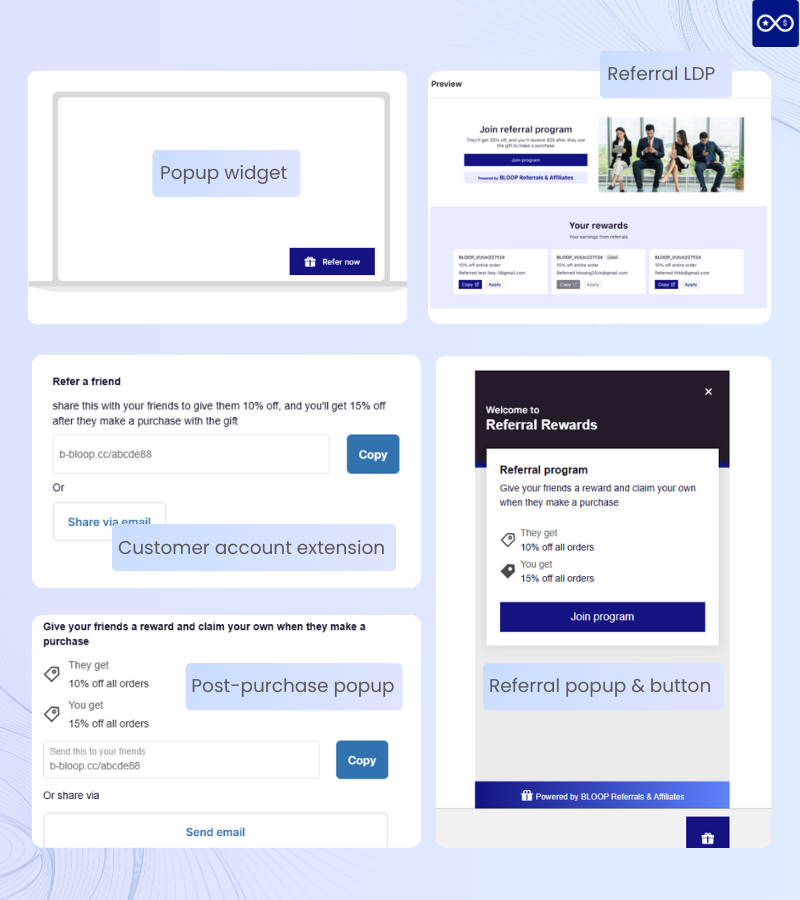
5. Measure and Iterate
Track key metrics weekly during your first month. Participation rate (percentage of customers who create referral links), share rate (percentage who actually share their links), and conversion rate (percentage of shared links that result in purchases) reveal where your program succeeds and where it needs adjustment.
If participation is low, your rewards might not feel compelling enough or customers might not know the program exists. If shares are high but conversions are low, the friend reward might need to increase or your products might not appeal to the referred audience.
Tips to Maximize Referral Revenue
Once your basic program is running, optimization strategies can significantly increase the revenue generated through referrals. Many successful programs generate 15-25% of total revenue through referral channels after optimization.
Incentivize Both Advocate and Friend
Double-sided rewards consistently outperform advocate-only or friend-only structures because they create mutual benefit. When both parties receive value, advocates feel better about sharing (they’re giving their friends a gift, not just promoting for personal gain) and friends are more motivated to complete their first purchase.
The optimal reward balance typically gives equal or slightly higher value to the friend, since they’re the one taking action on an unfamiliar brand. For example, offering friends $15 while advocates receive $10 often performs better than equal $12.50 rewards for both.
Use Post-Purchase Pop-Ups
Display a referral invitation immediately after customers complete their first purchase, when excitement and satisfaction peak. This timing captures customers while they’re already thinking about your products and likely to share their experience.
The pop-up ought to acknowledge their purchase, thank them, and explain how they can earn rewards by sharing with friends. Keep the message brief and make sharing possible in one click without requiring customers to navigate to a separate page.
Automate Reward Fulfillment
Immediate reward delivery creates positive reinforcement that encourages continued participation. When advocates see their friend made a purchase and their reward appears instantly in their account, they’re more likely to share with additional friends.
Delayed rewards—particularly those requiring manual approval or processing—reduce trust and participation over time. Customers begin to wonder if rewards will actually arrive, making them hesitant to promote your brand to their network.
Monitor KPIs Like Share Rate and AOV Lift
Share rate (the percentage of customers who actually share their referral link after creating one) reveals whether your program is compelling enough to motivate action. Healthy programs typically see 15-30% share rates, meaning roughly one in four customers who create a link actually shares it.
Average order value (AOV) lift measures whether referred customers spend more than your typical customer. Most programs see referred customers spending 10-25% more because they arrive with a recommendation from someone they trust, reducing purchase hesitation.
Pitfalls to Avoid When Running Referral Programs
Even well-designed referral programs can fail if they fall into common traps that reduce participation or damage customer trust. Being aware of pitfalls helps you avoid them from the start.
Overcomplicating Reward Rules
Complex reward structures confuse customers and reduce participation because people won’t share something they don’t fully understand. Rules like “Get 10% off your third purchase after referring three friends who each spend over $50” create too much friction to be effective.
Simple, immediate rewards perform best. “You get $10, they get $10” requires no explanation and creates clear motivation. If you want to add complexity later through tiered rewards or bonus incentives, start simple and add layers only after your basic program proves successful.
Ignoring Mobile Sharing UX
Over 60% of referral shares now happen on mobile devices, yet many programs create frustrating mobile experiences with tiny buttons, difficult-to-copy links, or sharing interfaces that don’t work properly on smartphones. Test your entire referral flow on mobile before launching, from creating a referral link to sharing it and completing a referred purchase.
Mobile-optimized sharing means one-tap access to native sharing options (text message, WhatsApp, email) rather than forcing customers to copy links and paste them manually into other apps.
Delayed Payouts That Kill Trust
When customers refer friends and then wait days or weeks for promised rewards, they lose faith in your program and stop participating. Worse, they may share negative experiences about delayed rewards, damaging your brand reputation among their network.
Automate reward delivery to occur immediately when referral conditions are met (typically when the referred friend’s order ships or passes the return window). If manual approval is necessary for fraud prevention, commit to processing rewards within 24-48 hours maximum.
Not Migrating Historical Data Properly
Switching referral apps mid-program without migrating existing referral relationships and pending rewards creates customer service nightmares. Advocates lose credit for referrals they’ve already made, and friends who were promised rewards find those rewards disappeared.
Before switching apps, export all referral data from your current platform and work with your new app’s support team to import it correctly. Verify that historical referrals are tracked and pending rewards will be honored under the new system.
Frequently Asked Questions About Shopify Referral Apps
Can referral apps migrate existing program data when switching platforms?
Most established referral apps offer data migration services to preserve existing referral relationships and reward balances. Contact the new app’s support team before switching to understand their migration process and timeline, which typically takes 1-2 weeks to complete properly.
How do referral apps prevent customers from referring themselves?
Modern referral apps use multiple fraud prevention methods including email verification, IP address tracking, and purchase behavior analysis. The systems automatically flag suspicious activity like multiple accounts from the same IP address or rapid-fire referrals that don’t match normal sharing patterns, while allowing legitimate referrals to process normally.
Which metrics indicate a successful Shopify referral program?
Key success indicators include referral conversion rate (typically 10-25% of clicked links result in purchases), average order value of referred customers compared to your baseline, and overall program ROI calculated as revenue generated minus rewards paid and app costs. Track participation rates (percentage of customers who create referral links) and customer lifetime value to measure true program impact.
Do referral apps integrate with Shopify POS for in-store purchases?
Many leading referral apps support Shopify POS integration, allowing customers to earn and redeem referral rewards during in-person transactions. Check with your chosen app provider to confirm POS compatibility and setup requirements, as this feature typically requires additional configuration beyond basic online store integration.
Start Growing Through Word of Mouth With Bloop
Choosing the right Shopify referral app comes down to finding the balance between powerful features and ease of use that matches your current business stage. While some merchants want enterprise-grade complexity, most Shopify stores benefit from platforms that deliver robust functionality without overwhelming setup processes or ongoing management requirements.
Bloop was built specifically to solve this challenge. The platform offers fraud prevention, dual referral and affiliate capabilities, and customization options that growing brands want, wrapped in an interface that makes setup genuinely simple. The platform handles everything from generating unique referral links to tracking conversions to distributing rewards automatically, letting you focus on your business rather than managing technical details.
Over 2,000 Shopify merchants already use Bloop, and you can test the platform risk-free with a 14-day free trial. Get started with Bloop today and start turning your satisfied customers into your most effective marketing channel.